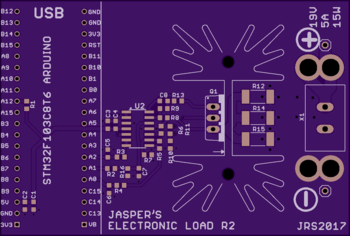ElectronicLoad: Difference between revisions
No edit summary |
m Add image link |
||
| Line 1: | Line 1: | ||
{{Project | {{Project | ||
|Name=ElectronicLoadV2 | |Name=ElectronicLoadV2 | ||
|Picture= | |Picture=ElectronicLoadV2.png | ||
|Omschrijving=Software voor Electronic Load v2 | |Omschrijving=Software voor Electronic Load v2 | ||
|Status=Initializing | |Status=Initializing | ||
Revision as of 14:51, 10 October 2017
| Project ElectronicLoadV2 | |
|---|---|

| |
| Software voor Electronic Load v2 | |
| Status | Initializing |
| Contact | bertrik |
| Last Update | 2017-10-10 |
Intro
This page is about software I'm writing for my brother who is developing an 'electronic load'. An electronic load is a thing that draws current from a power source in a well-defined way.
A likely use case for an electronic load is to discharge a battery with a constant current, while recording the voltage so you can make a nice discharge graph.
Hardware
For the hardware design, see http://sikken.nl/electronicloadr2.html
The basic principle of operation is that the electronic load has a circuit with a mosfet controlled by a microcontroller to draw a configurable constant current. The mosfet is connected to a heatsink that dissipates the power as heat.
The microcontroller can set the desired current, measure the actual current and measure the voltage. This way we can also do other modes than just constant current:
- constant power mode: from the voltage measured, we can calculate the current required to draw a constant power
- constant resistance mode: from the voltage measured, we can calculate the current to emulate a specific resistance